Key takeaways:
- Pro-life advocacy is a holistic approach that extends beyond opposing abortion to include supporting maternal care, poverty alleviation, and adoption resources.
- Sustainability and ethics are interconnected; our choices impact both the environment and the well-being of individuals, necessitating responsible resource management.
- Engaging in ethical advocacy includes continuous education, forming partnerships with like-minded organizations, and leading by example in daily practices for greater community impact.
- Building a sustainable pro-life community involves fostering networks that align life and environmental issues and engaging younger generations to inspire future advocacy.
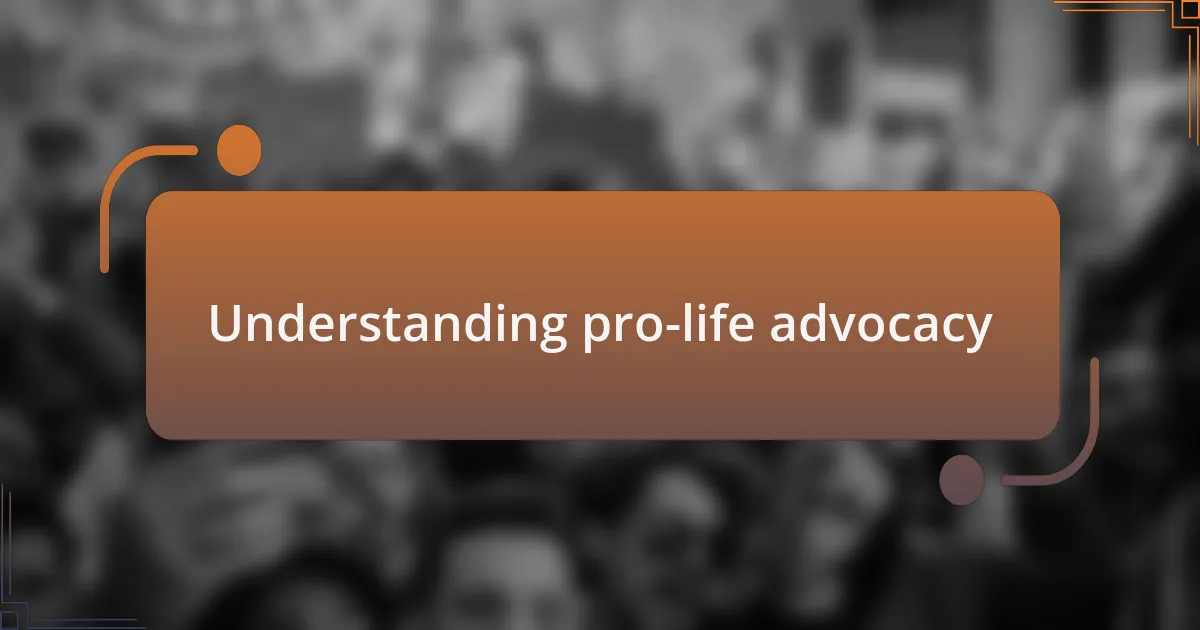
Understanding pro-life advocacy
Pro-life advocacy centers around the belief in the intrinsic value of all human life, from conception to natural death. I remember the first time I attended a pro-life rally; the energy was palpable, filled with passionate voices advocating for those who cannot speak for themselves. This experience deepened my understanding of the emotional stakes involved—each story shared there resonated with the fight for lives that often go unheard.
It’s important to recognize that pro-life advocacy is not solely about opposing abortion; it encompasses a broader commitment to protecting and nurturing life in various forms. I often find myself reflecting on the implications of this stance. What does it mean to support life? For me, it translates into championing maternal care, addressing poverty, and enhancing adoption resources. It’s a holistic approach that strives to uplift and empower individuals in their most vulnerable moments.
Moreover, engaging in pro-life advocacy invites us to confront challenging ethical questions. How do we reconcile our beliefs with the realities faced by pregnant individuals? I’ve found that listening to diverse perspectives is crucial. Each conversation can reveal layers of complexity, urging us to approach the subject with compassion and understanding while maintaining our core convictions. By fostering dialogue, we can better advocate for a culture that respects and honors life in all its forms.
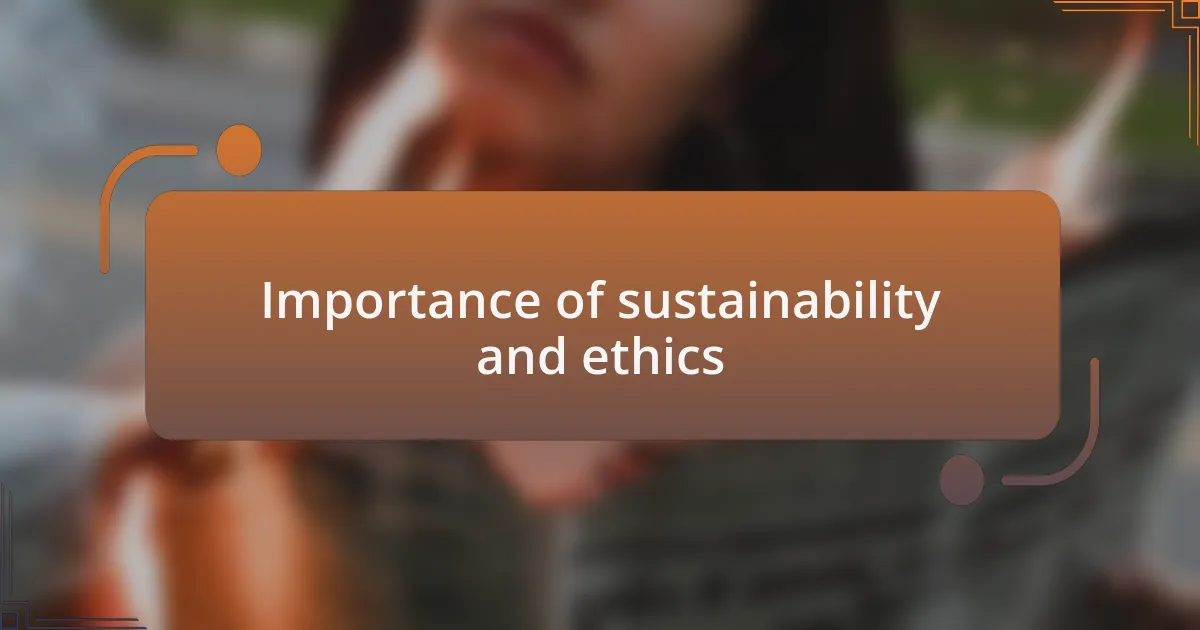
Importance of sustainability and ethics
Sustainability and ethics are intertwined in a way that reinforces our commitment to life. I remember volunteering at a local food bank, where I witnessed firsthand how food waste could feed those in need. It struck me that responsible resource management is not just about saving the environment; it’s about ensuring every individual has access to basic necessities. How can we advocate for life if we ignore the impact our choices have on the earth and its inhabitants?
Ethically, we must ask ourselves what kind of world we want to build for future generations. I often reflect on my own decisions—how I choose to shop, what products I support, and the companies I endorse. These daily choices reveal layers of complexity in our advocacy. Are we not obligated to advocate for sustainable practices that protect vulnerable communities? By promoting green initiatives alongside our pro-life stance, we can demonstrate that valuing life extends beyond the immediate and embraces future well-being.
The importance of sustainability also highlights our responsibility to educate others about ethical living. I remember attending workshops focused on sustainable practices, where I learned how small changes could create significant positive impacts. It’s essential to foster a culture of accountability, pushing ourselves and others to act ethically in every aspect of life. By doing so, we reinforce the very principles of advocacy that we hold dear, illustrating that nurturing life is a multifaceted endeavor that requires ongoing reflection and action.
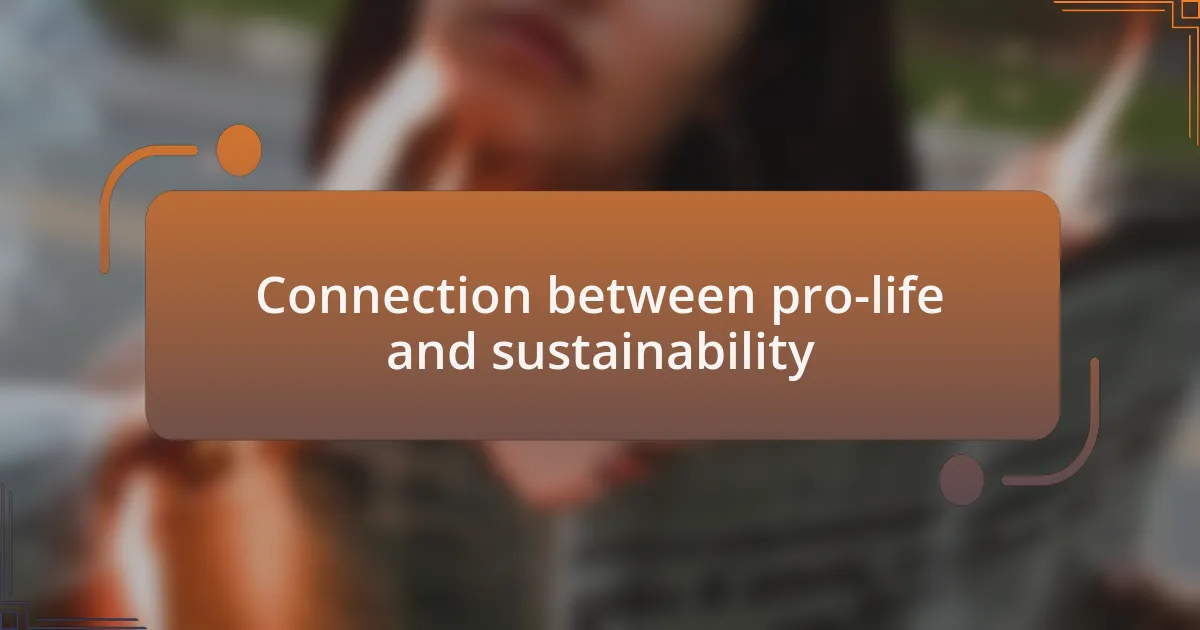
Connection between pro-life and sustainability
When I think about the connection between pro-life advocacy and sustainability, it becomes evident that both call for reverence toward life in all its forms. I was deeply affected during a recent community clean-up event; picking up garbage on a local beach helped me realize how our pollution not only harms the environment but also the lives that depend on it. Isn’t it fascinating how the health of our planet directly influences the well-being of future generations?
Sustainable practices mirror the pro-life ethos by promoting a respect for life that goes beyond human beings. I remember visiting an urban garden project that converts vacant lots into green spaces. Witnessing children playing in this safe, nurtured environment reminded me that our actions today shape the lives of the most vulnerable, including future generations. How can we truly advocate for life if we neglect the ecosystems that sustain us?
Moreover, embracing sustainability reflects our commitment to justice for all living beings. I often ask myself how my lifestyle choices affect not just my family, but the broader community. It dawned on me that by supporting ethical agriculture and local farmers, I’m not just nourishing my own body but also fostering a system that respects animal welfare and the environment. Isn’t it our duty to create a sustainable world where every life is valued and respected?
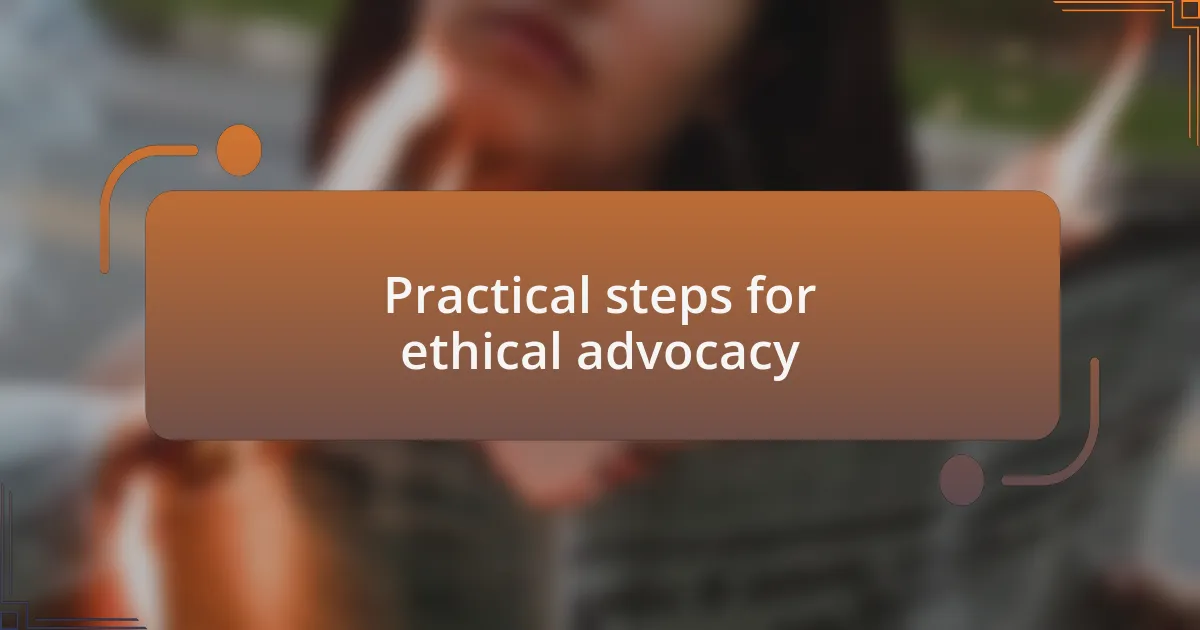
Practical steps for ethical advocacy
When engaging in ethical advocacy, one of the most practical steps is to educate ourselves continuously. I remember attending a workshop on ethical decision-making in advocacy, where I learned just how crucial it is to understand the nuances of the issues we support. Are we, as advocates, putting in enough effort to research the ethical implications of our actions? I believe we owe it to ourselves and those we represent to remain informed and thoughtful.
Another effective step is to create partnerships with likeminded organizations. In my own experience, collaborating with local environmental groups opened doors to initiatives I never knew existed. It was through these partnerships that I gained insight into multifaceted issues and saw how our pro-life message aligns with broader social justice themes. Isn’t it powerful when we realize we’re part of a larger community that shares our values?
Lastly, one cannot overlook the importance of leading by example in our daily lives. For instance, I made a conscious decision to reduce single-use plastics in my home, inspired by the belief that every choice impacts the environment and, consequently, lives. Has this choice made a difference? For me, it has reinforced my commitment to sustainable living and has sparked conversations with friends and family about practicing what we preach.
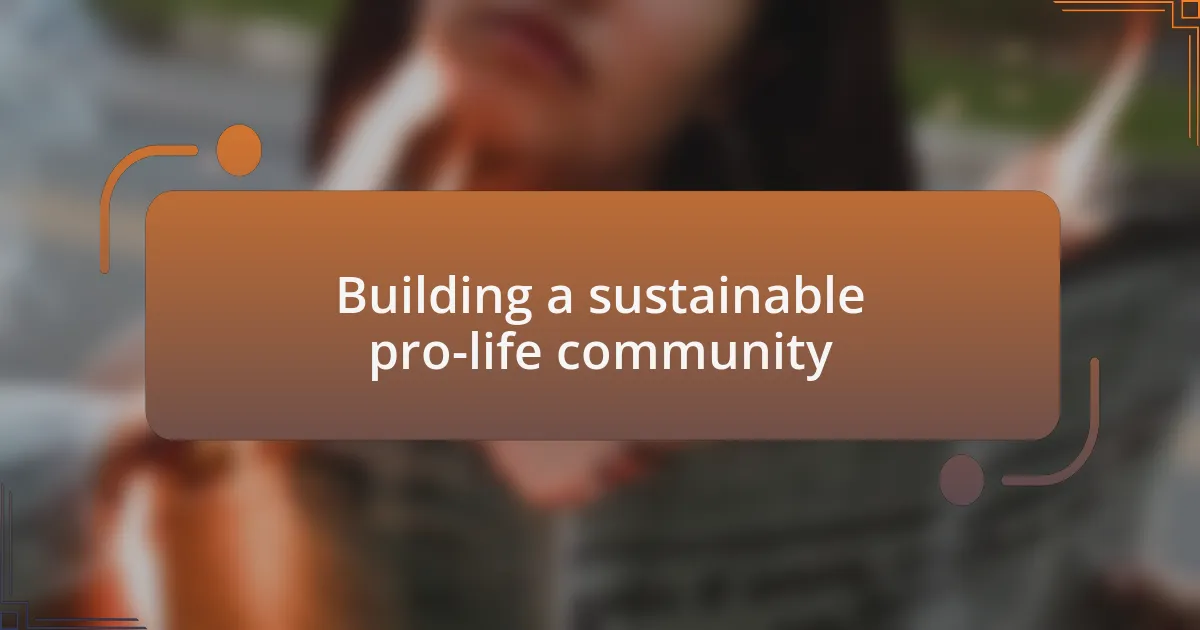
Building a sustainable pro-life community
Building a sustainable pro-life community begins with fostering a strong network of individuals dedicated to both life and the environment. I remember organizing a community event where we planted trees while discussing the interconnectedness of life issues. It was a simple act, yet witnessing the enthusiasm of participants who saw how nurturing our planet could reflect our pro-life values deeply inspired me. How can we ignore that each tree represents life, growth, and a healthier future?
Another vital aspect is ensuring that our community practices align with our advocacy. For example, I decided to support local farms that prioritize ethical, sustainable practices. By choosing to buy fresh, organic produce, not only do I nourish my body, but I also contribute to the welfare of farmworkers and the environment. Isn’t it rewarding to know that our choices can uplift others while keeping our planet healthy?
We must also engage younger generations in this vision. I invited local youth to create art projects that reflect their perspective on life and sustainability. Seeing their passion and creativity reminded me that we are not just advocating for life today, but for a future where our values can flourish. How can we best inspire them to embrace this journey? By sharing our stories and listening to theirs, we strengthen our community’s foundation for generations to come.
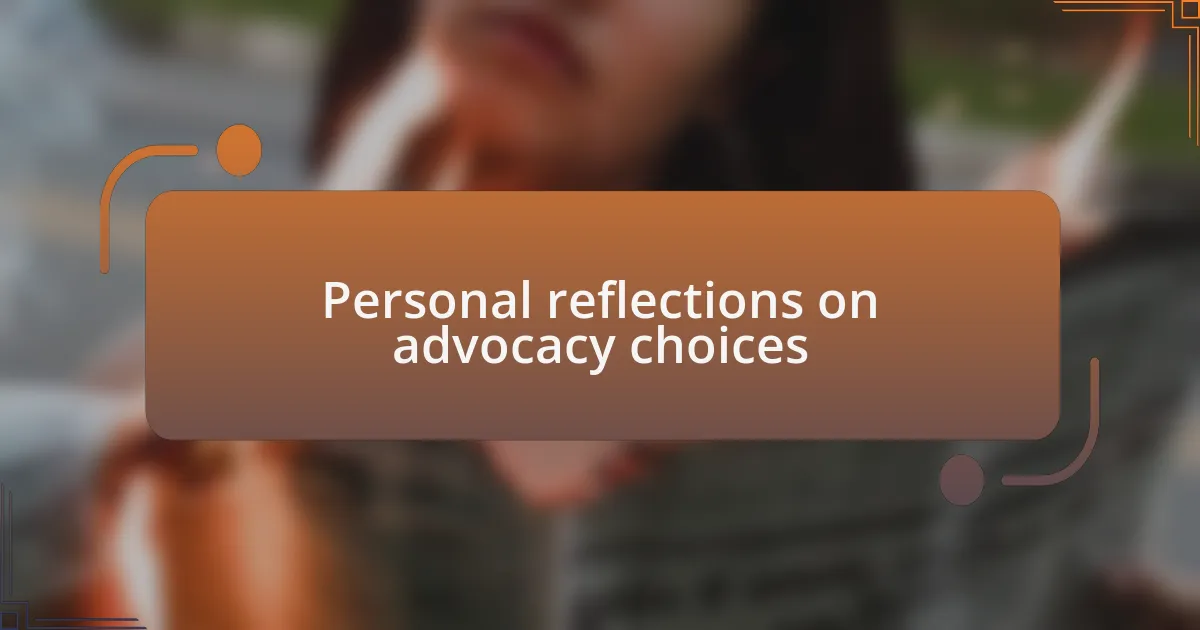
Personal reflections on advocacy choices
As I reflect on my advocacy choices, I am often struck by the moments where personal action meets collective impact. I remember attending a workshop on ethical consumption, and it challenged me to rethink my everyday decisions. How often do we pause to consider the origins of what we eat or wear? This realization ignited a passion in me to make more conscious choices, leading me to support brands that prioritize ethical practices.
In addition, I’ve had my fair share of hesitations during my journey. I once faced criticism for emphasizing environmental concerns within pro-life discussions. I shared my thoughts at a community meeting, and the atmosphere shifted; it became a space for healthy debate rather than division. Isn’t it powerful how embracing different perspectives can deepen our understanding and strengthen our mission? It’s these conversations that remind me that we grow not by staying silent, but by engaging openly.
Choosing to advocate for pro-life values alongside sustainability also opened up unexpected connections. Recently, I collaborated with a group advocating for clean water access, realizing that the fight for life extends beyond human existence. Who knew that our health relies heavily on the ecosystems around us? My experiences have shown me that true advocacy reflects a tapestry of interwoven issues, and each thread we pull enhances the narrative we craft together.